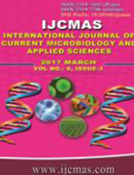


 National Academy of Agricultural Sciences (NAAS)
National Academy of Agricultural Sciences (NAAS)

|
PRINT ISSN : 2319-7692
Online ISSN : 2319-7706 Issues : 12 per year Publisher : Excellent Publishers Email : editorijcmas@gmail.com / submit@ijcmas.com Editor-in-chief: Dr.M.Prakash Index Copernicus ICV 2018: 95.39 NAAS RATING 2020: 5.38 |
The optimal composition of ferrous sulphate, L-ascorbic acid, Lactobacillus acidophilus and sodium alginate for encapsulation was studied. The Central Composite Rotatable Design- Response Surface Methodology (CCRD-RSM) was used to determine the optimum proportion of the matrices for higher yield of encapsulation (%) and strength of beads (g). Results showed that the entrapped viable cells and strength of the beads, increased by optimizing ingredients. The significant effect on encapsulation yield when increasing sodium alginate and L. acidophilus, while L-ascorbic acid has negative effect on the bead strength. It observed that 15 mg ferrous sulphate, 80 mg L-ascorbic acid and 3% L. acidophilus combined with 4% sodium alginate was optimal formulation for encapsulation techniques. The predicted response in terms of encapsulation yield and beads strength were 22.61and 1040.24, respectively. The desirability of the optimum condition was 0.838.
 |
 |
 |
 |
 |